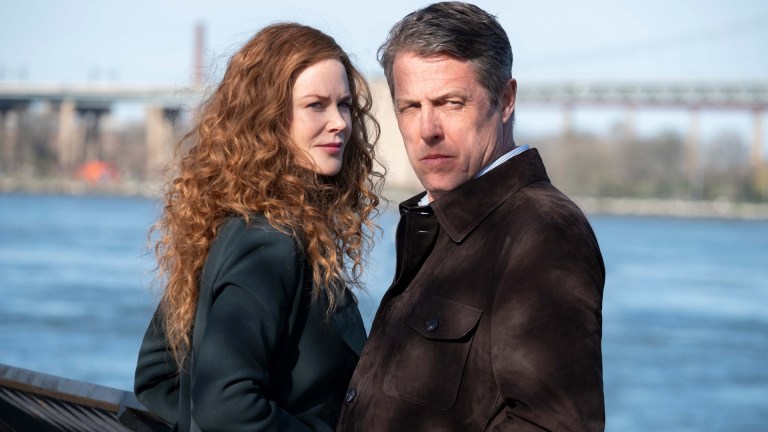The Undoing Director: ‘You Can’t Cheat a Thriller Audience’
Susanne Bier, director of The Undoing starring Nicole Kidman, talks about the unspoken pact with the audience and Hugh Grant’s “incredible sadness”

“It’s Like playing chess,” says Susanne Bier, director of the six part glossy thriller The Undoing, a twisty mystery based on the ‘grip lit’ novel You Should Have Known by Jean Hanff Korelitz. She’s talking about the delicate relationship with the audience it’s necessary to maintain when crafting a show packed with complicated characters full of secrets.
“It’s a very interesting, meticulous puzzle where you need to keep that precarious balance where you hold hands with the audience, but also hold back,” she explains. “I think the crucial thing is that you can’t cheat. There are rules about it. You don’t lie. You might do something which could be misleading, but is not really misleading or, you play with a borderline, but you never cross it. Because the point where you cross is when you lose the audience. So it’s about that game of how close can you get? And also, when do you lose their attention? When do things suddenly become predictable?”
The Undoing’s stock in trade is being unpredictable, with each episode leading you further down a dark path. The show stars Nicole Kidman as Grace, a successful therapist about to release her first book. She’s married to charming and charismatic doctor Jonathan (Hugh Grant) and has a son who attends an elite New York City school. But the arrival of strange, sensual young mother Elena Alves (Matilda De Angelis) turns Grace’s life on its head.
Bier says she likes to do test screenings – not the big official ones the studios often do, but showing episodes to people she knows and asking them questions.
“[I] discuss it with them and quite meticulously investigate when do they think what? When do they know what? When do they understand this?” she says.
The Undoing relies heavily on drip feed reveals keeping the audience guessing right up until the very last episode. Screening weekly on HBO and Sky, rather than dropping all at once, the show aims to keep the audience hooked so they’ll come back for more each week.
One of the major draws is the a-list cast, and Grant as the duplicitous Jonathan is a key part.
“Every single character in the show has that duality to a more or lesser degree,” says Bier. “The thing about Hugh Grant is that within him there’s the charm – and he’s insanely charming. He’s insanely funny. He’s really handsome. I think there is a dark side in him, which is not necessarily evil dark, but maybe there is a quite substantial sadness. As an actor, I’ve always looked at him and sensed that there was an incredible sadness. And I think that that sadness is what comes into play in this character. It’s such a mix of the lightness and the darkness and the darkness has various shapes, as has the lightness with him.”
Told from Grace’s point of view, even she isn’t an entirely reliable narrator, revealing slightly different levels of detail to her memories as she recalls them. And then there’s Elena, who in some ways is a complete enigma. Casting for this role was tricky, says Bier.
“We were trying to find someone who would be as charismatic as Nicole, but very, very different. And that’s a tall order. That’s a very, very, very tall order. We spent a long time. When we found her, we were elated. She’s a great actor. She comes into a scene and she’s just got such a presence.”
The Undoing is the latest in a line of female led thrillers arriving on the small screen. The show shares a creator in David E. Kelley and an actress, in Kidman, with Big Little Lies, which in season two also boasted an Oscar winning female director known for cinema, in Andrea Arnold. It stands alongside shows such as Little Fires Everywhere and Sharp Objects in its focus on family, and secrets. Like Big Little Lies, and Little Fires, The Undoing is also an examination of privilege, this time in a very specific part of New York City.
“That was the other draw when I read the first version of the script, it was New York City. Not just New York City, but also that rarefied Upper East Side. You walk in Central Park and you look up at those apartments on the edge of the park, and you wonder what the lives of the people who live there are like? You see immaculate women in limousines taking their kids to school wearing gym clothes, but still looking perfect. I was very intrigued by portraying that impenetrable world,” says Bier.
There is something rather wonderful about being a tourist in that world of opulence and power and watching it fall apart, it’s true. Bier says David E. Kelley only used the book for the first two episodes of The Undoing and was able to expand from there.
“There was a sarcastic tone already in that first draft that David had written, which deals with the world of privilege, which is making fun of that world of privilege that just assumes that everybody flies by private jet,” laughs Bier. “But there is that sense of obliviousness. David manages to hit that world so accurately. And also within the justice system, the way different groups in society are treated completely different.”
Grace’s father is played by Donald Sutherland and he is the embodiment of guilt free power and privilege. You almost respect him for his arrogance (and it’s a terrific performance).
“It’s funny because he’s that old patriarch, he very much belongs to a certain class. He takes his entitlement for granted. But he’s also very smart and he’s also right to a point. Nobody is entirely good. Nobody is entirely bad,” says Bier, who describes Sutherland as quite the presence on set, with his own brand of duality.
“You have Donald Sutherland coming to set and almost everybody stands up because he’s the grand man of film, television, theater. And then he comes and he makes these really childish jokes. And he’s such a mix of being that astonishing presence, but also, he will send funny mails with naughty drawings like a four year old. He’s a really wonderful mixture of everything you anticipate and then everything you really don’t anticipate.”
The other side of the coin is Edgar Ramirez’ cop who just wants to get to the truth behind the crime but finds himself constantly up against the walls that Grace’s position affords her.
“He is so fed up with her, not because of who Grace is, but because she’s privileged, he knows he can’t get to her. He can’t. He feels that she’s not telling the truth and she probably won’t ever have to, because she belongs to this class where you get away with it. And you sense his frustration and you sense that he is so sickly fed up with it.”
It all makes for an incredibly compelling thriller full of top class performance which is likely to join this year’s best lists. It marks another show that is conspicuously female centric both in front of and behind the camera, something we are seeing more and more of. TV appears to be streets ahead of cinema when it comes to roles for females.
“I generally think that TV is ahead, not just for women. I think as a general thing, it seems like television is much more courageous than film in these things,” says Bier, who herself has worked extensively in cinema too, winning an Oscar for her film In A Better World and drawing massive audiences for her Netflix adaptation of Josh Malerman’s Birdbox.
“It seems whoever pushed the start button for TV shows are much less scared and much more eager. And I think the competition is so crazy in the TV world, there’s so much great TV, that you need to be innovative. You need to be courageous. You need to ask yourself all the uncomfortable questions. Is this really visionary in some shape or the other?
“I think for a television show to succeed, it needs to be uncompromising, totally uncompromising. With whatever it sets out to be, it needs to be completely uncompromising. Otherwise, it’s going to fall into that gray, muddy, bunch of things, which are not really significant. I think the uncompromising thing is just more accessible within TV.”
The Undoing will be available weekly on Sky Atlantic & NOW TV from 26 October.
